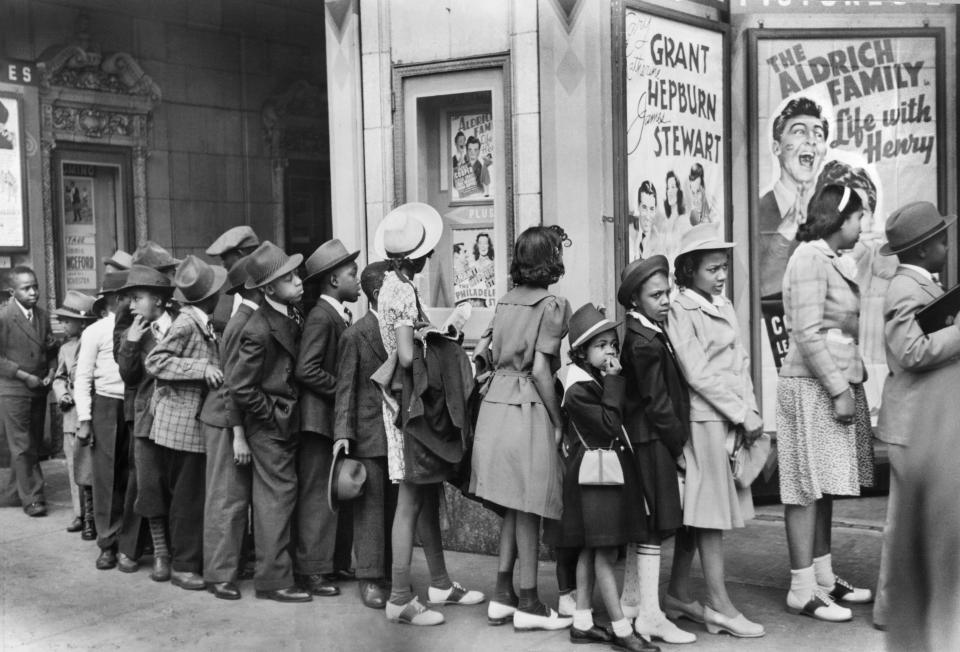A BLACK and white picture has caused an online frenzy, with some people believing it’s proof that time travel is real.
The vintage snap was taken in 1941 by Edwin Rosskam in South Side Chicago showing a line of children ready to head into the cinema.
AlamyA vintage snap from 83 years ago has sparked a frenzy online, prompting some people to speculate if time travel is real[/caption]
AlamyEagle eyed social media sleuths believe the young boy on the far right is holding an iPad[/caption]
However, it is the young boy on the far right that has captured everyone’s attention – and imagination.
Sharp-eyed conspiracy theorists believe they spy an iPad hidden in the young boy’s arms.
The first generation of Apple iPads was released in 2010, 69 years after the photo was taken.
The picture posted on Reddit has divided the time travel community.
One person said: “Bottom line, the kids are adorable and proud to be who they are BUT how is the first kid in line holding an Apple iPad in 1941.”
Another said: “All the way at the front you can see a kid with what looks to be an iPad.”
However, not everyone agreed with the time travelling iPad theory.
One person said: “I don’t see anything resembling an iPad.
“I see a woman carrying a book or perhaps a journal.”
Another person was also not convinced it was proof of time travel, saying: “Looks like a book to me.”
The one thing everyone could agree on was the stylish outfits worn by the children.
One person said: “They all are dressed so nicely.
“To wear your Sunday best to see the movies, it must have been a fantastic treat.”
Another said: “Part of me wishes we would all dress up like that for the little things, and then I debate if I am even going to shower today.”
A third added: “Loving the Zoot suits.”
Photographs from the past are often seized upon as “proof” of time travel.
Believers of time travel have previously spotted a man “clutching a mobile phone” in a 1940s photo.
The picture, taken on a beach in Cornwall in September 1943, shows a man in a brown suit looking at an item in his hands that looks suspiciously like a mobile phone.
But sceptics were quick to scorn on the conspiracy, insisting the man was simply rolling a cigarette.
Meanwhile, a photo of a man from the 1940s has previously sparked time travel theories.
The snap taken in 1943 in the Icelandic capital Reykjavik shows a crowd of locals and GIs from World War Two walking along a pavement.
In the photo, a man in the background looks at the camera with his hand to the side of his face.
And the picture sparked rumours among time-travel believers that the man was clutching a mobile phone to his ear.
The first-ever mobile phone – the Motorola DynaTAC 8000X – went on sale in 1973, exactly 30 years after the photo was taken.
Other historic images have also caused a stir among time travel believers.
Bonkers theories started to swirl regarding an ancient Greek tombstone after people spotted a woman using a laptop.
They claimed it was proof that a time traveller took a portable computer back to when the marble relief was sculpted in 100BC.
It came after art fans were baffled at a woman “holding an iPhone” in a painting from the 1860s.
What do scientists say about time travel?
By Mark Hodge
TRAVELLING through time may not be a fantasy explored solely in the world of science fiction as most theoretical physicists agree that it is possible.
Theoretical physicists such as Professor Steve Hawking and Professor Brian Cox believe that travelling at the speed of light could propel humans into the future.
This is based on the Albert Einstein’s Theory of Special Relatively, published in 1905, in which an object moving at the speed of light would experience time slowing down.
The boffins at CERN in Switzerland have propelled tiny particles at the speed of light using the Large Hadron Collider – but are a long way off strapping humans into a similar kind of machine.
Another theory is using wormholes to transport humans from one point in space to another instantly.
This idea was theorized in 1916 and was again developed from Einstein’s groundbreaking relatively theory.
Kip Thorne, renowned theoretical physicist at California Institute of Technology (Caltech), further developed the wormhole theory in the 1980s.
Thorne, who exec-produced mind-bending time-travel blockbuster Interstellar, believes that humans in the future would have to construct their own wormholes in order to travel through them.
What The Experts Say
Prof Stephen Hawking: “Time travel was once considered scientific heresy. I used to avoid talking about it for fear of being labelled a crank. But these days I’m not so cautious. In fact, I am obsessed by time.”
Prof Brian Cox: “Time travel into the future is possible. In fact, it’s an intrinsic part of the way the universe is built. We’re all time travellers in our own small way.”
Prof Ronald Mallett: “Depending on breakthroughs, technology and funding, I believe human time travel could happen this century,” says the Professor of Physics at the University of Connecticut in the US.

